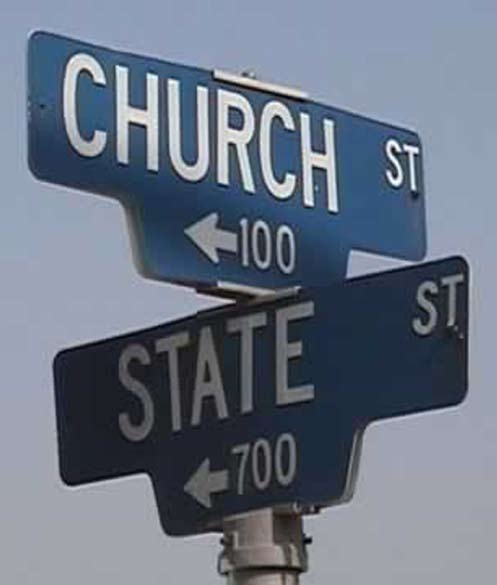President Calls for Abolishing Johnson Amendment
Destroy the Wall of Separation Between Church and State? Supporters May Want to Re-think That Idea

Photo Found on Wikimedia Commons
As the President makes bold plans to build a wall between the United States and Mexico, he also has strikingly bold plans to tear down the wall of separation between Church and State by repealing the Johnson Amendment, which is the legislation the IRS uses to regulate the boundaries for political activity in churches and non-profit charities.
In his remarks at the annual National Prayer Breakfast, President Trump vowed to “destroy” the legislation. He made significant gestures to his religious supporters, making statements such as, “I will defend your religious liberties and the right to fully and freely practice your religion as individuals, business owners and academic institutions.”
The President claims religious liberties are under threat in this nation and pastors live in fear of retribution for what they say in sermons.
As NPR and Associated Press detail in their reports, churches are almost never penalized under the IRS rule, and are rarely even investigated for political activity. Churches already receive a wide range of latitude when it comes to vote organizing, get-out-the-vote efforts, and even toward speaking out on social issues and government legislation.
There are currently no specific bills being debated in Congress, according to the list of current legislative activity, but the President campaigned on the promise to abolish the Amendment, and now has clearly stated his intention to produce some type of order on what he calls “religious liberty.”
The Investigative Fund at The Nation obtained a copy of a draft executive order that the President is allegedly considering. It is a 4-page draft, and as reported, it is breathtakingly broad. Entitled Government-Wide Initiative to Respect Religious Freedom, which, as drafted, would, as in the President’s own words, destroy the Johnson Amendment, effectively and precisely eliminating the boundaries between Church and State.
A copy of the draft order is included in The Nation’s article.
This abolishment basically gives the right to any person or organization in any industry to deny any service to anyone based on any religious or moral objection. As The Nation put it, it essentially legalizes discrimination.
New York Times reporter, Steven Waldman, wrote about the potential effects of a religious executive order. He titled his article, and then detailed in the article, “How Trump Would Corrupt the Pulpit”.
Waldman addresses misunderstandings over the term religious liberty and argues that religious institutions are not under attack in this nation. He portrays how the order would work if implemented, and bluntly opines that if the order becomes law, churches and other charities would become unregulated vessels for campaign contributions that would be a disaster for religion.
Ultimately, Waldman presents a strong case to anyone who supports abolishing the Johnson Amendment: Think hard.
According to the Associated Press, support for repealing the legislation does not appear to be widespread.
However, the President has moved brashly ahead on several other orders that did not appear to have much support. When asked by reporters about the draft order, White House Press Secretary Sean Spicer said the White House has nothing on that front now.
Hopefully the President will think hard before issuing a religious executive order such as this.
We’ll see if he does.


